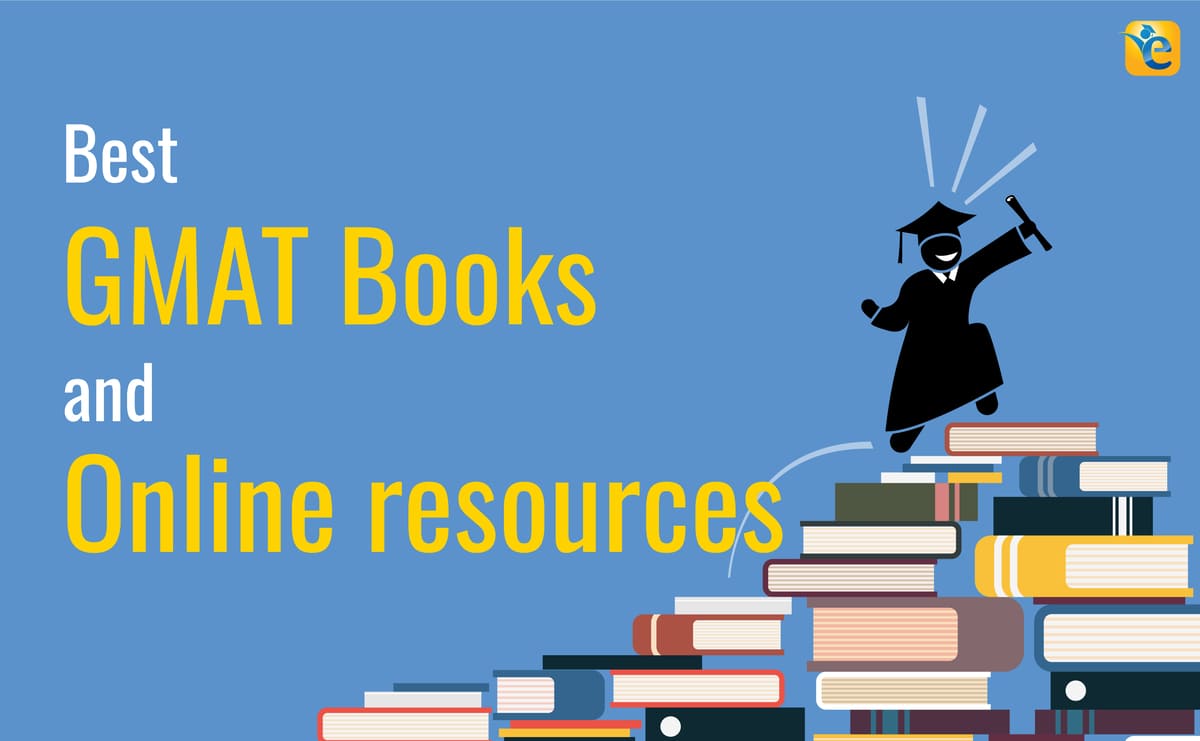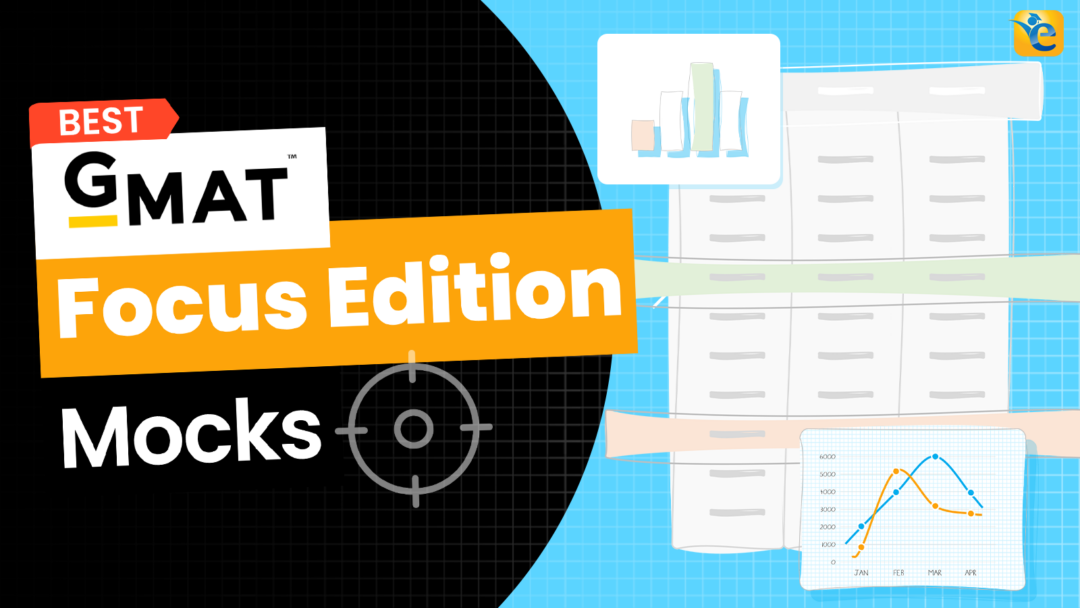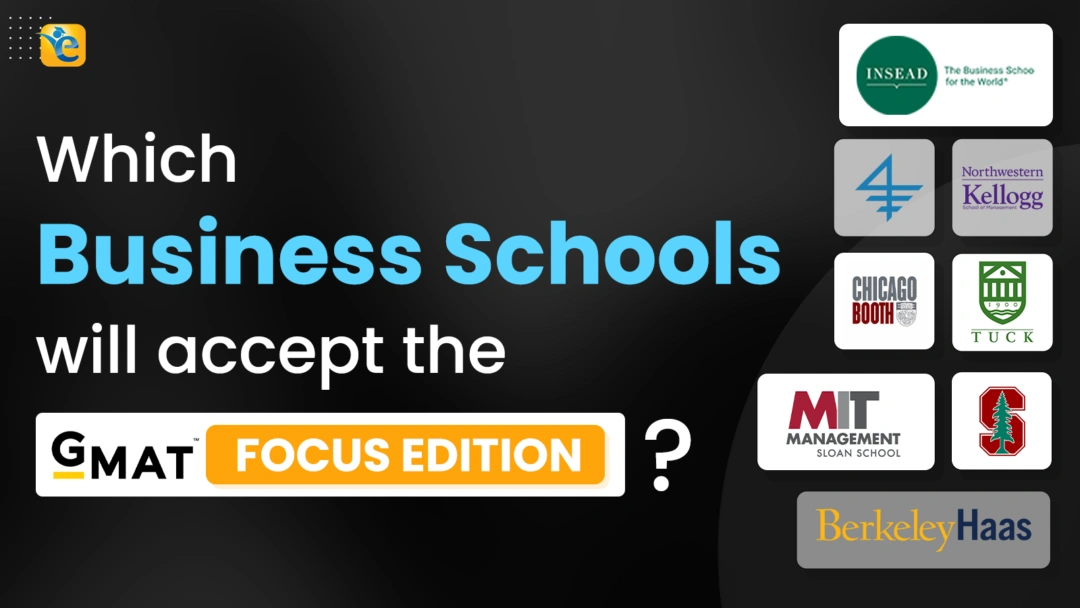Introduction
As you embark upon your GMAT journey, selecting the right preparation resources is a pivotal first step. If you’re currently deciding on study resources and leaning towards best GMAT books, the challenge of selecting the most effective one is amplified for those preparing for the newly launched GMAT Focus Edition (GFE). The GMAT’s latest iteration has necessitated a fresh approach to test preparation, with limited textual resources available for the Focus Edition. Recognizing this challenge, we’ve meticulously researched the most effective GMAT prep books tailored to these new demands.
Considering the evolving landscape of GMAT Focus prep, this article seeks to address the following questions.
- Understanding the GMAT Focus Edition’s Preparation Demands:
- We start by emphasizing the uniqueness of the GMAT Focus Edition. We outline the specific challenges and learning curves associated with this new format, setting the stage for why specialized preparation materials are crucial.
- What considerations should you make when choosing a prep book? :
- We discuss the elements that make a GMAT prep book invaluable for the Focus Edition, including content relevance, alignment with the new exam format, and comprehensive practice questions.
- Reviewing the GMAT Focus Edition Official Guide Books:
- We will review the official GMAT resources, highlighting their strengths and potential limitations.
- Comparing Resources for Old and New GMAT Resources:
- We analyze how resources for the classical GMAT format can be adapted for the GMAT Focus Edition, outlining the limitations and advantages of using these older resources.
This article will guide you through understanding your unique preparation needs and introduce you to the books that best address them.
Let’s get started!
Start GMAT Focus Prep Now
Unlock the best preparation resources at absolutely no cost! Answer a few questions related to your prep journey, and receive personalized feedback to start your preparation.
How Long Do You Need
to Score 705?
Get a personalized study timeline
Based on your current level and target score
Know which section to prioritize
Quant, Verbal, or DI — see where to focus first
Define your target percentiles
Clear metrics for each section to hit your goal
Outline – Best GMAT Preparation Books
This article will help you make an informed decision while choosing your best GMAT prep books. In this article, we will discuss:
- Introduction
- Start GMAT Focus Prep Now
- Changes and Challenges to Consider for the GMAT Focus Edition
- How to determine the best GMAT prep book for you? – Decision Parameters:
- The Best GMAT Preparation Books
- Adapting GCE Resources for GFE Preparations
- What Do Books Not Provide?
- Summary – Best GMAT Books
- Next Steps
- Best GMAT books 2023- 2024 – FAQs
Begin your GMAT preparation with the only GMAT prep company that has delivered more 700/645+ scores than any other GMAT Club partner. Don’t wait to start your journey towards success. Take our free trial today and discover how we can help you achieve your GMAT goals.
Changes and Challenges to Consider for the GMAT Focus Edition
The new GMAT Focus edition Syllabus introduces several significant changes to the exam. These include the elimination of the Analytical Writing Assessment (AWA) section, improvements to both the Verbal Reasoning and Quantitative sections, and the addition of a new section called Data Insights.
The new Data Insights (DI) section in the GMAT Focus Edition represents a significant enhancement over the existing Integrated Reasoning (IR) section, marked by its lengthier duration of 45 minutes, 50% longer than the current IR’s 30 minutes. It is weighed equally with the Quant and Verbal sections to provide a total score out of 805This extension allows for a more thorough assessment of candidates’ data literacy skills.
The DI section introduces five types of questions: Data Sufficiency (both math and non-math), Graphics Interpretation, Table Analysis, Two-Part Analysis, and Multi-Source Reasoning. This new section presents a unique challenge for test-takers, especially given the limited preparatory materials available
Additionally, the GMAC equates the importance of the DI section with the Quantitative and Verbal sections, which are among the most critical parts of the existing GMAT. It tests a candidate’s ability to interpret and analyze various data forms, a crucial skill in today’s data-centric business world. The inclusion of the DI section aligns the GMAT with modern business requirements, making mastery of this section essential for candidates to demonstrate their readiness for a data-driven business education and career.
While the Verbal and Quant sections of the GMAT have also undergone changes, they retain familiar question types, unlike the DI section, which requires new strategies and approaches for preparation.
The exam’s focus on application, particularly in the Verbal section with its Critical Reasoning and Reading Comprehension questions, demands a higher level of stamina and focus from candidates. The Quant section, now more aligned with traditional math tests and exclusively featuring problem-solving questions, may pose additional challenges for those who previously relied on Data Sufficiency questions. This shift in question types necessitates a new approach to preparation, especially for those who find the Quant section more challenging.
An additional challenge with regards to the DI section is the lack of resources and the need for online tools to effectively prepare for this section. Given the use of graphs and tables that can be modified and manipulated by students while solving certain types of DI questions, a complete and thorough preparation for this section necessitates the use of online tools.
How to determine the best GMAT prep book for you? – Decision Parameters:
Before discussing the decision parameters in detail, we would like to discuss the steps for GMAT preparation since your decision will hugely depend on which step you need to work on.
Major steps for GMAT Preparation
- Step 1- Understand your current ability
- Step 2 – Create a Study Plan
- Step 3 – Learn/ revise the concepts
- Step 4 – Practise the application of these concepts
- Step 5 – Get Test Ready

If we divide your GMAT preparation journey into broad steps, these steps would be:
- Step 1- Understand your current ability.
You would need a reliable Diagnostic test (discussed in detail in the last section) for this step. This step would help you understand your strengths and weaknesses.
Strengths and weaknesses can be categorized into sections or sub-sections or concepts. Sections refer to Quant, Verbal or Data Insights, while sub-sections include CR/RC in Verbal, Arithmetic/Algebra in Quant and MSR/TPA/GITA/DS in Data Insights. Concepts can be assumptions, probability, and so on. You can learn more about the Data Insights of the GMAT Focus Edition from this article. The more granular data you have, the better. It will help you maintain your strengths and work on your weaknesses.
The more granular data you have, the better. It will help you maintain your strengths and work on your weaknesses.
- Step 2 – Create a Study Plan
This step helps you understand the kind of effort you need to put in to get to your target score in the required time. Needless to say, you cannot create this plan without knowing your current abilities, your target score, and the time that you have for preparation.
A student who is currently at the 645 level and aims to get to 695 in a month does not need to do everything that a student who is preparing to improve from 585 to 665 in 4 months does. Creating an effective study plan optimizes your preparation.
You need to know your current abilities, your target score, and the time that you have for preparation to prepare your personalized Study Plan.
Watch the following video to understand how to create a personalized study plan:
- Step 3 – Learn/ revise the concepts.
This step will help you build your foundation. Hence, you need to be as thorough as possible. Know what is tested on the GMAT and study that. Knowing your strengths and weaknesses (from Step 1) will be very helpful here.
- Step 4 – Practise the application of these concepts.
This step will take you closer to your target score. Application of concepts learnt in step 3 is a vital part of taking your ability and score to the next level.
- Step 5 – Get Test Ready
Since GMAT is a computer-based adaptive test, you cannot score well just by solving questions correctly- you need to work on your timing, your ability to solve questions from multiple sub-sections, and your ability to take a 2-hour long test. To do this, you need to take GMAT Focus Mocks.
Please take note of these steps as we will keep referring to them in the rest of the article. More importantly, take note of which of the above preparation steps you are at currently and which steps that you need help with.

Decision Parameters
Let us now discuss the parameters that can help you select the resource that suits you best. As you go through these parameters, understand what you should expect from your GMAT preparation resource. Then, we shall review the resources. So, let’s go through the parameters one by one.
- Learning concepts vs. revising concepts
Some of the books explain concepts in complete detail and thus are helpful for students who want to start learning from scratch. Other books are good for students who just need to revise their concepts. It is an important criterion that will help you shortlist the books.
- Sub-sections that you need to target:
While some of you need to prepare for all sub-sections, some – especially re-takers – may be looking for guidance in specific sections or sub-sections such as MSR, RC, or Algebra. Accordingly, you can opt for a book that offers effective learning in those areas. .
- Customer support-
While books provide you with all the study material, you may need some guidance or support at times. This guidance/ support may be related to the concepts or related to the preparation strategy. If you are a person who believes in resolving your queries yourself after doing research, you may not need such support. However, if that is not the case, you should select a book that offers customer support.
- Format: Paperback Vs. Online-
Various options are available in each of these formats. However, since the GMAT is a computer-based adaptive test, you need to get used to taking tests on the computer eventually. So, the options that you have are-
- Start with a paperback resource and then switch to an online format later or
- Start with the online format itself.
- Cost-
While you will definitely consider the first-time purchase cost, make sure you consider the chances of having to re-purchase a new course. For example, you may opt for a resource that seems cheaper to you. But, in case it does not work, you will have to re-purchase the same course/ different course and re-take the exam too. Hence, the final cost will end up being much more than the first-time cost. Also, make sure you try the free version of the course, if available, in order to understand your comfort level with it.
You may opt for a resource that seems cheaper to you. But, in case it does not work, you will have to re-purchase the same course/ different course and re-take the exam too.
I am sure you now understand the major decision parameters and know what you expect from the GMAT book that you will buy. Let’s now discuss the best GMAT prep books one by one.
If you are planning to take the GMAT, we can help you with a personalized study plan and give you access to quality online content to prepare. Write to us at acethegmat@e-gmat.com. We are the most reviewed GMAT prep company on GMAT club with more than 2600 reviews and are the only prep company that has delivered more than 700+ (645+) scores than any other GMAT club partner. Why don’t you take a free trial and judge for yourself?
The Best GMAT Preparation Books

Books were the traditional and one of the most popular medium for the GMAT Preparation
In the rapidly evolving landscape of GMAT preparation, the scarcity of resources for the new GMAT Focus Edition is a direct result of its novelty and extensive changes. Currently, the official guide stands as the primary, comprehensively updated book resource specifically tailored for this updated version of the exam. This situation highlights the transitional phase in GMAT prep, where the adaptation of resources to the new format is still underway.
As mentioned in the last section, since the GMAT is a computer-based adaptive test, you will eventually need to switch to the online format.
GMAT Official Guide 2023-2024 , Focus Edition
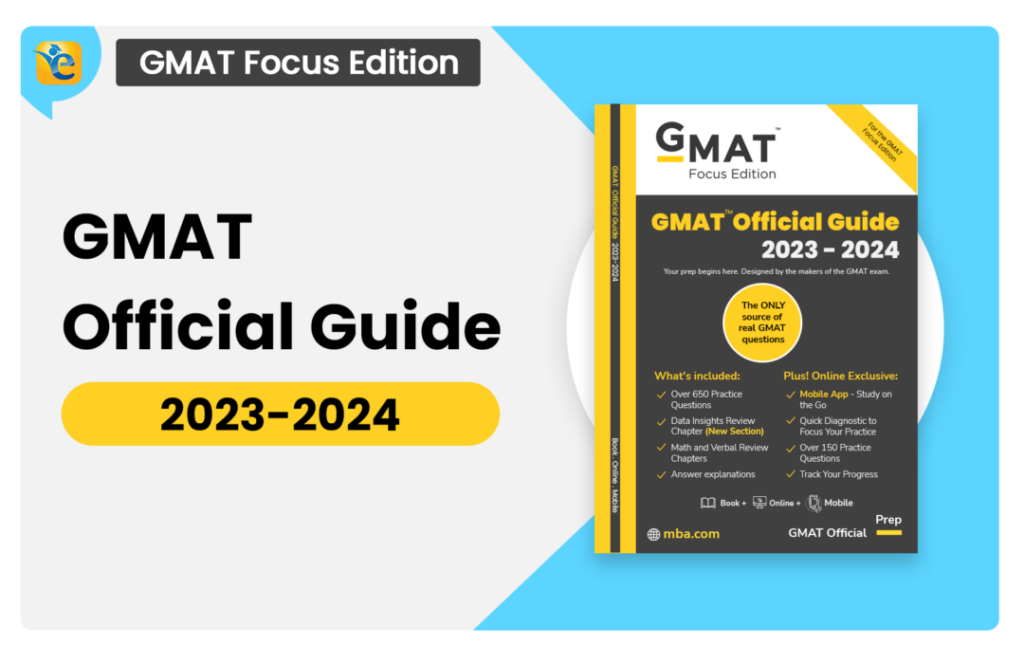
The definitive guide from the makers of the GMAT exam- the Official Guide- is the one book that is a must for GMAT preparation. It defines what is and is not tested on the GMAT. Year after year, the OG has provided test-takers with a comprehensive collection of real GMAT questions that have appeared in the past, to reflect the actual exam’s format and difficulty level.
This guide is also available in the online format and mobile app. Since an updated version is released every year, it is preferable to buy the latest version (GMAT Official Guide 2023). Irrespective of which other book you purchase, you should definitely purchase the Official Guide. You can go through this article to know more about how to use Official Guide.
The OG2023 is masterfully aligned with the GMAT Focus Edition, showcasing features specifically designed to tackle this version’s unique challenges:
- Data Insights Section: This chapter is a key response to the new exam’s focus on digital and data literacy. It’s a crucial adaptation from previous GMAT versions, marking a significant shift in content emphasis. This section provides the right introduction to this new section to help test takers improve.
- Diverse Question Formats: Addressing the Focus Edition’s variety, the guide includes more than 80 Data Sufficiency questions and directs to an Online Question Bank for additional question types. This variety ensures comprehensive preparation.
- In-Depth Reviews for Quant and Verbal: Tailored to the updated Focus Edition, these sections provide essential formulas and exercises, reflecting the exam’s increased rigor.
- Enhanced Explanations: The guide excels in offering detailed explanations for each question type, equipping students to meet the nuanced demands of the Focus Edition.
Each feature of the OG2023 is deliberately crafted to provide students with a robust understanding and preparation for the GMAT Focus Edition
Adapting GCE Resources for GFE Preparations
Classical GMAT: A Broad Range of Study Resources
The Classical GMAT offered a wealth of resources, catering to a wide spectrum of learning needs. They were designed to offer in-depth learning opportunities, ideal for those who sought thorough preparation across all GMAT sections. Here is a brief on some of the most popular books and additional guides other than the OG
- GMAT Official Advanced Questions: Ideal for high-scorers, offering around 300 challenging questions from past exams.
- Manhattan Prep’s ‘All the GMAT’: Comprehensive coverage of all GMAT concepts, suitable for foundational learning.
- Kaplan GMAT Prep Plus: Focused on concept revision, providing a balanced mix of practice questions and strategies.
- Princeton Review’s “Premium Prep”: Good for revising concepts, offering a combination of detailed content and practice tests.
- Nova’s GMAT Math Prep Course: Comprehensive for GMAT Math, emphasizing concept learning with practical examples.
- Powerscore’s GMAT Critical Reasoning Bible: Specializes in GMAT argumentation, suitable for critical reasoning preparation.
- Manhattan Prep’s GMAT Strategy Guide (SC, CR, RC): Focused guides for specific subsections like SC, CR, and RC.
GMAT Focus Edition: Utilizing Classical Resources Effectively
For GMAT Focus Edition (GFE) preparation, classical GMAT resources can be strategically adapted. Books like the GMAT Official Advanced Questions and Manhattan Prep’s ‘All the GMAT’ provide a deep understanding of fundamental concepts and challenging practice questions, beneficial for the GFE’s rigorous standards. Kaplan GMAT Prep Plus and Princeton Review’s “Premium Prep” can reinforce core concepts and strategies. However, students should be aware that these resources don’t specifically address the unique elements of GFE, such as the Data Insights section. Hence, supplementing them with updated GFE-specific resources is crucial. Additionally, these books will have questions and resources targeted towards concepts such as SC and Geometry, which are not relevant to GFE test takers. Hence, you might not be getting the most bang for your buck.
Adaptation and Limitations
While classical GMAT resources are still useful for building foundational knowledge for certain GFE topics, they fall short in covering the specific elements of the GMAT Focus Edition, such as the Data Insights section.
While some classical GMAT resources for Integrated Reasoning introduce some Data Insights (DI) question types, they are not fine-tuned to the specific demands and adaptive nature of the new GMAT Focus Edition’s DI section. Also, the non-quantitative aspect of Data Sufficiency (DS) questions, a novel element in the Focus Edition, is entirely absent in these older resources.
Consequently, students relying exclusively on these materials may find themselves inadequately prepared for the GFE’s unique content and structure, particularly in mastering the full scope and adaptability of the DI section and the new DS question format.
This comparison underscores the evolving nature of GMAT preparation, highlighting the need for updated resources that align with the specific requirements of the GMAT Focus Edition.
Top of Form
What Do Books Not Provide?
Nothing is perfect! The same is true for the GMAT Prep books. Even with the best books, you will need an additional resource for these steps:
1. Evaluation of Your Current Ability
Since GMAT is a computer-based adaptive test, you need to take a similar test to understand where you falter. However, most of the books provide paper-based diagnostic quizzes with very few questions. These quizzes can, at best, give you an idea of the kind of questions that you will get on the GMAT. These are not designed to give you an idea of your strengths and weaknesses, your performance in a timed quiz, or your performance in a mixed adaptive quiz. Hence, this is one of the steps where you would need an additional resource.
Take a FREE GMAT mock to understand your baseline score and start your GMAT prep with our free trial. We are the most reviewed online GMAT Prep company with 2600+ reviews on GMATClub.
2. Personalized Study Plan
While many books provide you with a study plan, none of them provides a personalized study plan. So, if you and your friend want to get to 695 from 645 in a month, the study plan that you will get will be similar, irrespective of your strengths and weaknesses or the kind of effort that you can put in.
3. Personalized Customer Support
Books provide general test-taking strategies, but they cannot help you with the specific issues that you will face during your preparation. For example, what if you have a doubt in a question or in its solution, what if you are not improving in CR even after doing the course multiple times, or what to do if the timing seems to be your only issue? You would need an additional resource to get these queries resolved. Below is an example of a query and personalized strategic suggestion that was shared with one of our students who then scored 730.

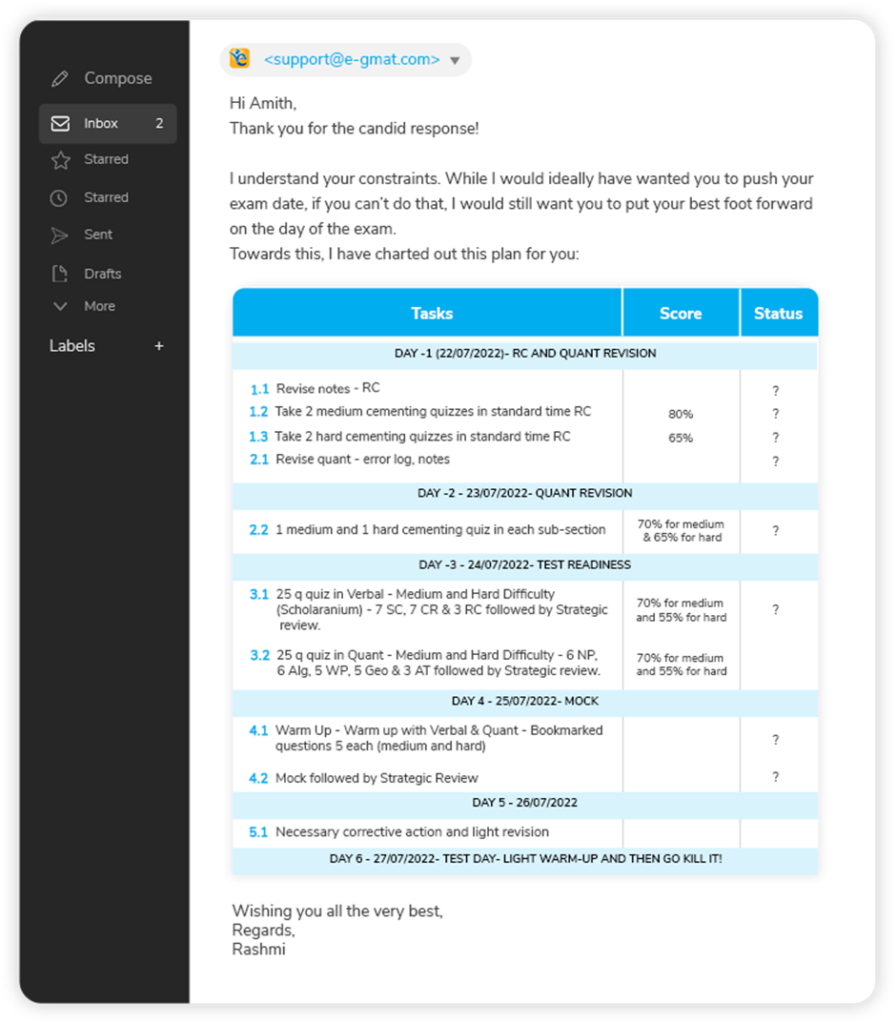
4. Data Analytics
Books explain the concepts but do not provide any analysis of your performance. For example,
- You learned a concept and solved the questions related to that concept. Now, you will not get any feedback whatsoever on how well you have absorbed the concept or do you need to take any corrective steps before moving to the next step.
- Similarly, let’s say you solved 20 Hard CR questions. Now, all you can depend on is how well you are able to analyze your performance- i.e., understand the topics that each question tests, check how well you performed on each topic, record the time that you took for every question, and pick out the questions that took you excessive time, etc.
If you want to improve from, let’s say, 585 to 645+, you need to know the areas that need your focus. Re-doing everything will not help. We would suggest that you define the important parameters that you are going to track before taking such quizzes. You can get an idea of these parameters from the SIGma-X mock analysis.
If you want to improve from let’s say 585 to 646+, you need to know the areas that need your focus. Re-doing everything will not help.
To get an idea of the above parameters and track your performance, take a FREE SIGma-X mock. With its personalized analysis and detailed evaluation of your performance, the mock test will provide you with valuable insights into your strengths and weaknesses. This will help you identify the areas where you need to focus your attention and improve your score.
5. Tracking for Predictable Success
If you are studying from books, you will have to track your progress yourself. How much course you have completed, are you on track with respect to schedule, is your performance improving- these are some of the questions that you should keep a track of. Such tracking helps you understand whether you are on the right track, or whether you need corrective actions. Below is a screenshot showing how we, at e-GMAT, track your accuracy. It is one of the aspects that we track.
6. Customized Practice Tests
Once you have analyzed your performance on a quiz, you need to bridge the identified gaps and then solve more questions that test you on the faltering points. For example, let’s say you took a 20 Hard questions CR quiz and noticed that you are faltering in strengthen questions, then you may want to revise the application files related to strengthen concept and then solve maybe strengthen questions to validate that you have bridged the gaps. Unfortunately, books just provide you with a set of questions. Now, it is up to you to find the relevant questions and solve them.
These points explain why online courses account for 90% of the success reported on GMAT Club. These courses have evolved over the last few years to help you prepare smartly. If you need help with any of the above given points, do experience our free trial.
Summary – Best GMAT Books
With this understanding of decision parameters and the unique features of the best GMAT prep books for the Focus Edition, along with their limitations, you should be better equipped to select the most suitable resource. Make the most of these insights to find the book that aligns best with your preparation needs. Remember, while these books provide valuable guidance, your success will ultimately hinge on your commitment and hard work.
Next Steps
I would now recommend that you go through these articles to understand how to prepare for the GMAT irrespective of the resource that you have selected:
- How to prepare for GMAT Verbal?
- How to prepare for GMAT Quant?
- GMAT Reading Comprehension – An Overview
- GMAT Critical Reasoning – An Overview
- How to make the most out of OG?
Most people believe that a typical MBA journey starts with acing the GMAT. But what if I tell you there is one step before acing the GMAT, which will impact your career trajectory for years to come. That step is choosing the right GMAT preparation resource. These resources could be GMAT books or online courses. In this article, we have provided information on the best GMAT books and online resources available in 2023-2024 to help you with your preparation.
There are various resources available for GMAT preparation, making it challenging to understand which book or resource is useful. The first thing that comes to anybody’s mind is to opt for the GMAT Official Guide.
But is this resource good enough to achieve your target score? That is precisely what we’ve answered in this article.

Best GMAT books 2023- 2024 – FAQs
No, the GMAT official guide is not enough. You should not just depend on one resource while preparing for the GMAT exam.
The Graduate Management Admission Test is a 2 hour 15 minutes long computer adaptive test (CAT). It is developed by GMAC to provide business schools with standard measures of applicant’s preparedness for graduate-level academic work. Read our article to know everything about GMAT.
The GMAT Syllabus comprises of topics that are further grouped in sub-sections and sections. It consists of three sections:
1. Verbal
2. Quant
3. Data Insights
Critical reasoning, and reading comprehension are included in the Verbal section, arithemetic and algebra in the Quant section and multi-source reasoning, graphical interpretation, table analysis, two part analysis, and data sufficiency on the Data Insights section.
The registration fee for the GMAT test is $275 in most countries. However, the GMAT cost will be more than just the registration fee and will differ from country to country.
Here is an article on GMAT costs in India, UK, Europe, US, and the Rest of the world.
The GMAT exam is 2h15m hours which includes your breaks and Test instructions.
The GMAT is a test of high-order reasoning skills. This test is taken by 200,000+ people every year, and the average score at top business schools is 720+/ 665+. Also, only 6% of the test takers score 720/665 or above in the GMAT exam


